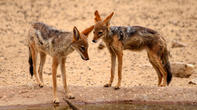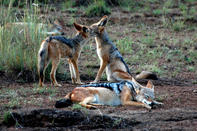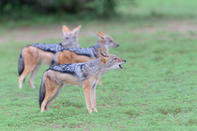Resourceful and Faithful
Black-backed jackals are remarkable for their adaptability and they adjust and survive in varied and even harsh environments. They are exceptionally resourceful animals and are renowned for their ability to acquire and share knowledge of how to avoid danger and still thrive as a population.

Jackals are monogamous (mono meaning one and gamous meaning marriage). A male and female pair for life. They share the duties of defending a territory, the male dealing with male offenders and the female with female offenders. So established is their bond that should one of the pair be killed, the other is likely to lose the territory and may possibly even die.
Role Models

Jackals live in extended family groups. Pups from the previous year’s litter will stay on in the parent’s territory and assist with raising the next litter. They perform duties including regurgitating food for the pups and lactating mother, guarding the den and playing with or grooming the pups.
These ‘helpers’ offset the need to locate mates, establish territories and raise litters of their own until they are older and more experienced. Gradually young animals will make excursions further and further away from their natal territory until they find a niche for themselves. Jackals make use of the holes created by burrowing animals like aardvarks, to house their pups.
The existing cavity is modified to include a large main chamber between a meter and two meters across and is equipped with several escape routes. Jackals change their den sites regularly to prevent the build-up of parasites or if there is pressure from predators in a particular area.
The den is used only while the pups are reliant on the adults for food. By 3 months old, the pups are weaned and can forage with the adults.
Calls of the Wild
